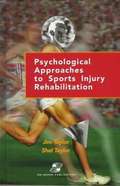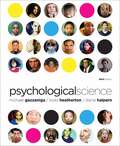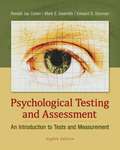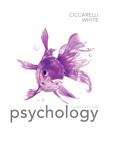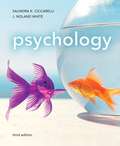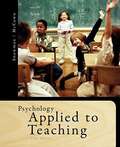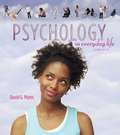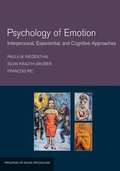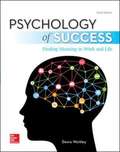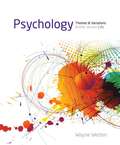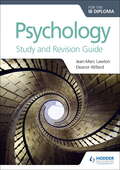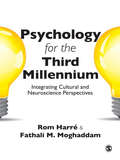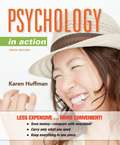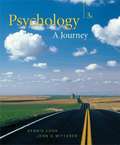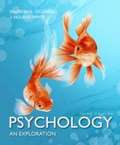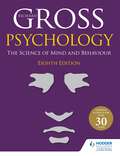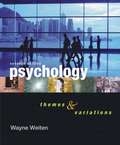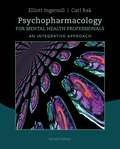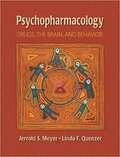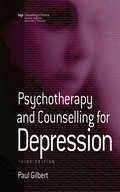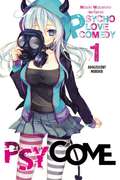- Table View
- List View
Psychological Approaches to Sports Injury Rehabilitation
by Jim Taylor Shel TaylorIn dedicating this guide for rehabilitation specialists, consultants J. Taylor and S. Taylor (U. of Connecticut Health Center, Farmington) refer to frustration and patience as well as to pain and expertise, recognizing that bouncing back from sidelining sports injuries entails mind as well as body. Augmented by celebrity soundbites, the authors detail the referral process for assessing psychological problems; mental influences on rehabilitation (motivation, anxiety, focus); facilitatitive techniques (imagery, using negative thinking positively, pain management, social support); return to the sport; and development of a psychological rehab program (with sample forms, program prescription summaries). Annotation c. by Book News, Inc., Portland, Or.
Psychological Science (3rd Edition)
by Michael S. Gazzaniga Diane F. Halpern Todd F. HeathertonThis edition presents the latest developments in psychology in an engaging, visually stimulating format. The text enhances student understanding and stimulates active learning with Halpern's unique science-of-learning pedagogical system; relevant, real world examples; and an art program tailored especially for visual learners. Instructors and students will benefit from the most integrated media package available for an introductory course.
Psychological Testing and Assessment: An Introduction to Tests and Measurement (Eighth Edition)
by Ronald Jay Cohen Mark E. Swerdlik Edward Sturman.Psychological Testing and Assessment presents students with a solid grounding in psychometrics and the world of testing and assessment. The book distinguishes itself through its logical organisation, readable text, and many pedagogical aids, such as the “Meet an Assessment Professional” feature in every chapter which highlights the works of people such as Dr. Stephen Finn, architect of therapeutic assessment. Now in its eighth edition, this text has consistently won enthusiastic reviews not only for its balance of breadth and depth of coverage, but for content that brings a human face to the assessment enterprise.
Psychology
by Saundra Ciccarelli J. WhiteWith its engaging writing style and comprehensive coverage of key research, Psychology, 4/e, awakens students’ curiosity and energizes their desire to learn more. This title draws learners into an interactive experience of psychology. The authors establish clear learning objectives tied to the most recent APA-recommended undergraduate learning guidelines.
Psychology (3rd Edition)
by Saundra K. Ciccarelli J. Noland WhiteThe most learner-centered and assessment-driven text available With its engaging writing style and comprehensive coverage of key research, Psychology, 3/e, awakens students' curiosity and energizes their desire to learn more. This brief version draws readers into an ongoing dialogue about psychology, allowing them to fully grasp the subject. The authors establish clear learning objectives tied to the most recent APA-recommended undergraduate learning outcomes. MyPsychLab is an integral part of the Ciccarelli/White program. Engaging activities plus assessments provide a teaching and learning system that helps students master psychological concepts more readily. With MyPsychLab, students can watch videos on research and applications, participate in virtual classic experiments, and develop critical thinking skills through writing. Psychology, 3/e, is available in a new DSM-5 Updated Edition. To learn more, click here. This title is available in a variety of formats - digital and print. Pearson offers its titles on the devices students love through Pearson's MyLab products, CourseSmart, Amazon, and more.
Psychology Applied to Teaching (13th Edition)
by Jack Snowman Rick Mccown Robert BiehlerPsychology Applied to Teaching, 13th Edition combines fresh concepts and contemporary research with long-standing theory and applications to create a book that addresses the needs of today's teachers and students.
Psychology In Everyday Life, 2nd Edition
by David G. MyersCarried by the author's acclaimed empathetic voice, Psychology in Everyday Life is David Myers' most inviting text to date. This book represents a breakthrough in the interplay of text and visuals, yet, as always, provides a rich source of scientific insights into the lives we live. Any student, regardless of age or background, will find it a text that speaks directly to him or her, and will embrace it not just for its grade-raising potential, but for its revelations about what makes a person a stronger student, a more tuned-in friend or partner, a more effective worker, or a wiser parent.
Psychology Of Emotion: Interpersonal, Experiential, And Cognitive Approaches
by Paula M. Niedenthal Silvia Krauth-Gruber François RicThis textbook discusses fundamental issues in the definition and measurement of emotion, including: conscious and unconscious processes; the ways in which emotions arise in, and are constrained by, social situations and social processes; the regulation and sharing of emotion and their effects of mental health; and the manner in which culture (including subculture) shapes or moderates some of these processes. The book also focuses on the component processes of emotion, their functions, and the ways in which these interact with the social environment. Rather than deny either that emotions are biologically determined or that they are culturally created or shaped, both biology and social situation are treated as important forces in the elicitation and the experience of emotion. Each section of the book is structured around specific approaches or models, and the precise questions that they were constructed to address. The theories and models are also placed in their in historical context. Discussion of the different approaches is elaborated by summaries of the extant scientific evidence, as well as examples of specific experiments or studies that were designed to evaluate the question. Timely, engaging real-world examples are used from a variety of international contexts. The pedagogic features, including concise introductions and summaries, discussion questions, and suggested readings, have been incorporated into the volume, making this an ideal text for a course of Emotion, which can be found as an option within many social psychology and cognitive psychology courses.
Psychology Of Success
by Denis WaitleyPsychology of Success introduces the fundamental psychological principles of success--principles applicable to everyone regardless of age, background, or specialty. Unlike many psychology books, Psychology of Success doesn't take a one-size-fits-all approach. Instead, it asks you to take an active role in defining what is right for you as an individual. Psychology of Success calls on you to use self-awareness and critical thinking strategies to examine your dreams, values, interests, skills,needs, identity, self-esteem, and relationships. This will help you set and achieve goals that are in harmony with your personal vision of success.
Psychology Themes and Variations, Briefer Version, Ninth Edition
by Wayne WeitenPSYCHOLOGY: THEMES AND VARIATIONS, BRIEFER EDITION, 9TH EDITION helps you experience the excitement of this fascinating field, while helping you study and retain what you learn! Filled with practical ways that you can apply psychology to your everyday life, this best-selling psychology textbook is an experience in learning that you'll remember long after you complete your introductory psychology course. Critical Thinking Applications in every chapter give you specific critical thinking strategies you can apply to what you read. Every chapter of this book offers tools to help you focus on what's important and shows you how to study in ways that help you retain information and do your very best on exams.
Psychology and Life
by Philip G. ZimbardoThe classic text that defined the field, Psychology and Life, Fifteenth Edition, celebrates Phil Zimbardo's 30th anniversary as its author by returning to its original themes: presenting psychology as a science and as a tool to understanding our daily lives. The book continues to provide a rigorous, research-centered survey of the discipline while offering students features and pedagogy that will spark their interest and excite their imaginations.
Psychology for the IB Diploma Study and Revision Guide
by Eleanor Willard Jean-Marc LawtonExam board: International BaccalaureateLevel: IB DiplomaSubject: PsychologyFirst teaching: September 2017First exams: Summer 2019Encourage students to achieve their best grade by simplifying and focussing exam preparation with full syllabus coverage, practical exam tips and practice questions. · Ensure thorough exam preparation with full coverage of the syllabus including concise revision notes and clear explanations of the requirements and topics. · Focus on related vocabulary with key terms highlighted for each topic/sub-topic.· Give examples of what is required to achieve the best grades with examiner advice and tips, including the common mistakes to avoid.· Reinforce understanding and consolidate learning and exam focus with Exam Practice Questions.
Psychology for the Third Millennium: Integrating Cultural and Neuroscience Perspectives
by Rom Harré Fathali MoghaddamAs the 21st Century opened, the discipline of psychology seemed to be separating into two radically distinct domains. Qualitative and Cultural Psychology focused on the discursive means for the management of meaning in a world of norms, while Neuropsychology and Neuroscience focused on the investigation of brain processes. These two domains can be reconciled in a hybrid science that brings them together into a synthesis more powerful than anything psychologists have achieved before. For the first time, there is the possibility of a general psychology in which the biological and the cultural aspects of human life coalesce into a unitas multiplex, unity in diversity. This textbook ambitiously aims to and succeeds in providing this unity. Fathali M. Moghaddam and Rom Harré have designed a textbook brought together with additional voices that speak to the similarities and differences of these two seemingly distinctive domains. This bridge-building will encourage a new generation of undergraduate students studying psychology to more fully appreciate the real potential for the study of human behaviour, and as such it will represent a more provocative alternative to standard general psychology textbooks. It also support teaching in a host of courses, namely 2nd and 3rd courses on the conceptual and philosophical nature of psychology, social psychology, critical psychology and cognitive science. Selectively, it will also represent a very interesting and different choice for foundation level students too.
Psychology in Action 10th Edition
by Karen HuffmanThis flagship book's 10th edition helps students examine their own personal studying and learning styles with several new pedagogical aids -- encouraging students to apply what they are learning to their everyday lives.
Psychology: A Journey
by Dennis Coon John O. MittererIn a course where professors are frequently confronted by students who haven't actually read their textbooks, this text offers a solution. The shortest, most succinct of the books written by Dennis Coon, PSYCHOLOGY: A JOURNEY presents psychology in a way that sparks readers' curiosity, insights, imagination, and interest getting students "hooked" on psychology and eager to read on. The first author to integrate the proven SQ4R (survey, question, read, recite, relate, and review) active learning system into a psychology textbook, Coon helps readers grasp major concepts, develop a broad understanding of psychology's diversity, and see for themselves how psychology relates to the challenges of everyday life. Because readers become actively involved with the material, they develop a basic understanding of psychology that they take with them into their future courses and careers.
Psychology: An Exploration (3rd Edition)
by Saundra K. Ciccarelli J. Noland WhiteNow in its third edition, Psychology: An Exploration draws students into the discipline by showing how psychology relates to their own lives. Clear learning objectives, based on the recommended APA undergraduate learning outcomes, guide students through the material. And assessment tied to these learning objectives lets students check their understanding, while allowing instructors to monitor student progress and intervene when necessary to bolster student performance.
Psychology: Principles in Practice
by Spencer A. RathusOne needs to develop a variety of critical thinking skills to fully grasp the range of concepts and methods used in the study of psychology and this book guides one to achieve that.
Psychology: The Science of Mind and Behaviour 8th Edition
by Richard GrossBuild a solid foundation for students to develop the skills and knowledge they need to progress with the updated edition of Richard Gross's best-selling introduction to Psychology.This 8th edition of Psychology: The Science of Mind and Behaviour is the essential guide to studying Psychology, helping over half a million students during its 30 years of publication.- Easily access psychological theories and research with user-friendly content and useful features including summaries, critical discussion and research updates.- Develop evaluative skills, with new evaluation boxes, encouraging students to put classic and contemporary studies into context.- Consolidate understanding by identifying common misconceptions.- Stay up to date with revised content and the latest psychological research.- Understand the research process with updated contributions from leading Psychologists including Elizabeth Loftus, Alex Haslam and David Canter.
Psychology: Themes and Variations (Seventh Edition)
by Wayne WeitenThe Seventh Edition of Wayne Weiten's popular text, Psychology: Themes and Variations, continues to offer students a unique survey of psychology with three distinct goals: to show both the unity and diversity of psychology's subject matter; to illuminate the process of research and its intimate link to application, and to make the text challenging to think about and easy to learn from.
Psychopharmacology for Mental Health Professionals: An Integrative Approach (2nd Edition)
by R. Elliott Ingersoll Carl F. RakThis book is an introductory level text on psycho-pharmacology for students preparing for careers in psychology, counselling, and social work.
Psychopharmacology: Drugs, the Brain, and Behaviors (2nd Edition)
by Richard A. Harvey Michelle A. Clark Richard Finkel Jose A. Rey Karen WhalenRecent advances in molecular pharmacology and brain imaging have revolutionized our understanding of how psychoactive drugs work. Now, from the authors of Principles of Neuropsychopharmacology, comes a new undergraduate textbook integrating these developments. The first section of the book provides extensive foundation materials, including the basic principles of pharmacology, neurophysiology and neuroanatomy, synaptic transmission, and methods in psychopharmacology. The second section describes key features of major neurotransmitter systems, including the catecholamines, serotonin, acetylcholine, glutamate and GABA. The third and fourth sections discuss theories and mechanisms of drug addiction and psychopathology. All major substances of abuse as well as drugs used to treat mental illness are covered. Psychopharmacology: Drugs, the Brain and Behavior is unique in its breadth of coverage, ranging from historical accounts of drug use to clinical and preclinical behavioral studies to the latest research on drug effects in transgenic mouse models. Student engagement with the material is fostered by opening each chapter with a relevant vignette and by providing breakout boxes presenting novel or cutting-edge topics for special discussion. The book is extensively illustrated with full-color photographs and line art depicting important concepts and experimental data. Psychopharmacology: Drugs, the Brain and Behavior is appropriate for undergraduate psychopharmacology or drugs and behavior courses that emphasize relationships between the behavioral effects of psychoactive drugs and their mechanisms of action.
Psychosocial Aspects of Disability (Fourth Edition)
by George Henderson Willie V. BryanThis new edition of Psychosocial Aspects of Disability strikes a balance of past, present, and future views of individual, family, societal, and governmental interaction and reaction to persons with disabilities. The past is presented in Part 1, Psychosocial Aspects of Disabilities, in which a view of the evolution of societal reactions to disabilities and persons with disability is presented. This perspective is important because it explains how some of the beliefs and attitudes toward disabilities and those who have a disability have developed. Additionally, Part 1 makes us aware from a historical perspective why persons with disabilities have been subject to certain types of treatment from family, friends, and society. Parts 2 and 3 provide discussion of present situations for persons with disabilities as they move toward better inclusion in society. Chapter 5 discusses the need for empowerment of persons with disabilities and how they can empower themselves. Chapter 6 discusses the need for better employment opportunities for persons with disabilities because this is a significant way of empowering persons with disabilities. Chapter 7 discusses federal legislation that has been developed to facilitate the empowerment of persons with disabilities. Part 4, Psychosocial Issues, to a large extent, represents the future for persons with disabilities. The chapters in this section discuss some disability issues that some persons with disabilities will encounter and/or by which they will be affected during the twenty-first century. Additionally, there is discussion of the need for persons with disabilities to attain the full human rights to which they are entitled.
Psychotherapy and Counselling for Depression (Therapy in Practice)
by Paul Raymond Gilbert`Excellent! Excellent! Excellent! I would thoroughly recommend this book to any other counsellor of psychotherapist. It is described on the back cover as 'outstanding', 'valuable' and an 'essential resource' and I would fully endorse all of these descriptions. I have been qualified for 10 years and have had extensive client experience, but feel I have gained so much from Gilbert's wisdom on this topic. It is excellent value for money and again I would recommend it to any practitioner' - The Independent Practitioner 'This book takes the reader gently but thoroughly through the biopsychosocial processes that underpin depression. Excellent worksheets and information sheets are provided as appendices. [It] is a valuable resource for those who already work with depression and essential reading for those considering working in this field' - Therapy Today `Paul Gilbert provides the reader with a refreshingly wide-ranging, integrative and up-to-date understanding of the nature, assessment and treatment of depression. All psychological therapists will benefit from reading his important book' - Healthcare Counselling and Psychotherapy Journal `Paul Gilbert writes in a scholarly, yet accessible, style on the bio-psychosocial perspectives of depression. I agree with him that knowledge of such areas is crucial to being able to work effectively with people experiencing depression' - Nursing Standard, 5 star review `Psychotherapy and Counselling for Depression, Third Edition by the distinguished psychologist, Paul Gilbert, is an outstanding contribution to the field. I read this book with great enthusiasm and interest - and, I must acknowledge - admiration. All clinicians will benefit from reading this valuable book' - Robert L. Leahy, President, International Association for Cognitive Psychotherapy Paul Gilbert's Psychotherapy and Counselling for Depression, Third Edition is a popular and practical guide to working with people suffering from depression. The book is based on a wealth of research into evolutionary, cognitive, behavioural and emotion-focused approaches to depression. It outlines how to work with general negativity, sense of failure and abandonment, and feelings of powerlessness, anger, shame and guilt The book examines the essential stages of the therapeutic process from conceptualization and formulation through to a wide variety of interventions for different types of difficulty. It has been greatly revised, expanded and updated for the Third Edition and: o explores in depth the biopsychosocial processes underpinning depression o shows how a compassionate mind approach can be incorporated into different types of therapy o includes a new chapter focusing on the role of the therapeutic relationship, including therapeutic dialogues o features detailed guidance with case examples on how to work with a wide variety of depressions. Psychotherapy and Counselling for Depression, Third Edition is an essential resource and comprehensive guide for practitioners and anyone involved with treating depression. Paul Gilbert is Professor of Psychology in the Mental Health Research Unit at Kingsway Hospital, Derby.
Psycome, Vol. 1: Murderer in the Flower of Death
by Namanie Mizuki MizushiroAccused of a crime he didn't commit, Kyosuke Kamiya is sent to Purgatorium Rehabilitation Academy. Suddenly, he's surrounded by a variety of fetching lasses--each one a murderer! Worse, he's famous for being the "Dozen Demon," a killer responsible for twelve deaths! When the busty, gas mask-wearing beauty Renko Hikawa approaches him, the difference between death and desire becomes very narrow indeed. How is Kyosuke gonna graduate alive?
